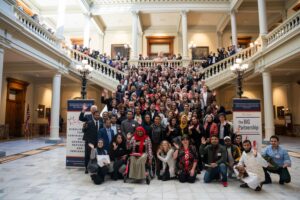Last week, our team members Tracie and Isabel had the privilege of participating in the inspiring New Americans Celebration at the Georgia State Capitol. Amidst the bustling halls of the state’s capitol building, attendees gathered to advocate for policies that have the potential to transform the lives of immigrants and refugees in our Georgia community. From reduced tuition fees for immigrant students to relicensing immigrant healthcare professionals, the proposed policies offer hope and opportunity for our immigrant neighbors and highlight the importance of voicing our opinions to those who represent us in government. In this blog post, we’re excited to share insights from the event, highlighting the policies that can make a meaningful difference and empowering you to join the movement in advocating for immigrant rights in your community.
Can you spot Hope’s Tracie and Isabel in the crowd?
In-State Tuition for Immigrant Students
In-state tuition makes college more affordable for students attending public colleges or universities in their home state, cutting tuition costs by two to three times. Sadly, many immigrant students can’t benefit from this because of their immigration status and how long they’ve lived in the state. SB 264 wants to let refugees, Special Immigrant Visa recipients, and Humanitarian Parolees qualify for in-state tuition as soon as they arrive. HB 131 suggests offering DACA recipients a lower tuition rate than out-of-state students, but a bit higher than in-state rates.
These bills could really improve not only the lives of immigrants in Georgia but would benefit the Georgia community as a whole. College graduates usually earn twice as much and are more likely to be employed. By helping immigrant students go to college, we’re helping them contribute to Georgia’s economy. Plus, many immigrant students consider Georgia their home, even if they don’t meet all the official requirements. Giving them access to in-state tuition not only helps them pursue their education but also shows they’re welcome in their new home.
Relicensing for Immigrant Healthcare Professionals
Georgia faces a critical shortage of healthcare professionals, with many counties lacking essential medical services like psychiatrists, OBGYNs, pediatricians, and general physicians. Surprisingly, there are hundreds of trained doctors and healthcare workers available, but they can’t practice because they weren’t trained in the U.S. and lack the necessary licenses. If Georgia’s lawmakers create simpler pathways for foreign-trained healthcare professionals to get licensed, it could be a game-changer. Not only would Georgians finally get the care they need, but immigrant healthcare workers could return to the field they trained for. Shockingly, 26% of foreign-born healthcare professionals are not working to their full potential. This change could transform the lives of all Georgians for the better. While there isn’t a specific bill addressing this issue yet, it’s crucial to raise awareness with your representatives. By bringing up this issue, you can help them understand the gap in our healthcare system and the urgent need for action.
Language Services in K12 Schools
One major hurdle for immigrants is the language barrier, especially when it comes to accessing services like education for their children. Currently, there are not enough resources for those who don’t speak English as their first language, even though 1 in 5 students in Georgia public schools has at least one foreign-born parent. Surprisingly, 85% of children with immigrant parents are born in the U.S. and often end up acting as family interpreters, especially in the school setting. HB 127 aims to address these challenges by establishing standards for schools to better support English speakers of other languages (ESOL). Passing this bill would be a significant step toward ensuring educational equity for all Georgia students.
How Can You Help?
Your voice is powerful, especially when it comes to standing up for yourself and your community. Don’t underestimate the impact of reaching out to your representatives, whether at the state or federal level. Remember, they work for us! They genuinely want to hear from you so they can represent your interests effectively. As a member or supporter of the refugee and immigrant community, your perspective is invaluable. Lawmakers need to understand how their decisions affect the people they serve, and your input is key to making that happen.
Contacting your representatives is easier than you might think. You can call their office, send an email, mail a letter, or even talk to them face-to-face. Not sure who your representatives are or how to reach them? You can find out here.


